| item(s), Total: $0.00 View Cart |
| Shopping cart is empty. |
Hello and welcome to DECEMBER
It's also the lead up to Christmas! Such a busy time of year; work parties, family catch-ups, club wind-ups - there's always a lot to do. We hope you have a lovely month - regardless of the busy-ness; we're looking forward to a little break at Christmas after a busy Spring. Green Life's last day of trading before Christmas is Saturday, 21st December - closing at 4.00pm We are CLOSED Monday 23rd - Sunday 29th December Please be aware that any online orders for bagged products need to be placed by 16th December to ensure pre-Christmas Delivery. Bulk delivery orders can be placed right up to our Christmas closure - but first come, first served - so don't delay! We recently had our audit for our Organic Certification with NASAA - the assessor spent half a day at Green Life Soil Co checking our processes and records, and we're happy to say our Certificate has been renewed; and we're equally as excited to advise a new member to the Certified Organic stable - our LIVING SOIL! This is a true "just add water" growing medium for pots - indoors and out. The first Sunday of every season is the Kalamunda Garden Festival; so on the 1st December it was held once again up at Stirk Park in Kalamunda. Green Life Soil Co sponsors a speakers' marquee, and it was great fun to have so many knowledgeable and entertaining speakers in 'our' tent - Sue McDougall, Vasilis, Kit Prendergast and of course Costa - we had a great day! If you still haven't made it to a KGF - the next one will be on Sunday, 2nd March 2025 - so mark your calendars! It's a privilege to be able to learn from such a wide range of experts - I always come away with some real nuggets of information to share with customers. UPDATE MONDAY 9th DECEMBER If you live in certain areas of Perth, DPIRD are asking you to collect and destroy your fruit and some vegetable crops (cook or eat if ripe!) to assist with the control of this pest - it's a temporary measure and if successful, will lead to future crops being successful. There is an address finder on their website to help you figure out what quarantine zone you are in. PLEASE CHECK THE DPIRT WEBSITE at this link for more information & make sure to keep abreast of further announcements. In this Newsletter:Jobs to do in the garden NOW Jobs to do in the garden NOWChristmas is ON OUR DOORSTEP! So it's time to get busy...
What to Plant NOWCheck out our FREE when to plant guides on our website- but here's a quick reminder list:
Seed orders are coming through regularly; so our range is continually changing. We've got fresh seedlings and herbs too - so pop in and grab what you need to fill gaps in your Summer crops. Remember our Luffa/Loofah growing competition for kids!! Grab a free packet when you're next in store and get planting with your kids/grand kids - see who can grow the biggest or weirdest luffa to win some kids gardening prizes - a great school holiday project. Garden Bugs - MitesIf you follow our social media, you might have seen our post regarding red spider mites on our Cape Gooseberry bush in the Green Life garden. Lesley ordered some predatory mites (Californicus) from Bugs for Bugs - and within a week, they had devoured most of the pests and the bush was regaining health and colour. So good to see! And now, at home, our bean crop has a two spotted mite infestation - so I've just ordered some predatory mites (Persimilis) and I'll let you know how we go with those once they've arrived. It's great to have options other than sprays to use on our food crops. So far, based on our experience at work, I'd recommend the Bugs for Bugs option - it is expensive when you factor in express freight and quarantine (because they're living creatures) - but in some instances you may well find it's a good option.
Two spotted mites are sap sucking pests that are almost invisible without magnification. (Pictured here - courtesy of the DPIRD website.) Mites live in colonies - some types produce a fine webbing you can see on the leaf underside. Because the mites are hard to see, sometimes the symptoms are thought to indicate a plant disease. Mites have a short life cycle, and tend to breed up quickly in optimal weather conditions (dry and hot), but can be wiped out naturally once those conditions change. Again, mites have many natural predators, so hopefully they'll do the job for you. As a last resort, wettable sulphur or neem oil can help; but you must make sure you're treating the underside of leaves or where the mites are actually present. Pest oil, natural soap sprays, vinegar sprays & DE may also be helpful; and always remove badly affected plant material & dispose of in the bin. Unless composting at high temperatures, mites can survive and you can re-infect your garden. Low toxic ways to deal with spider mites include spraying the leaves (especially the underside) with water, and using horticultural pest oil, neem oil or potassium soap sprays - although timing of these sprays is important (early morning is best) to prevent burning of leaves (with oil in sunlight) and minimise impacts on beneficial insects. Here's some information about two of these treatments:
The manufacturers of Eco-neem claim it is safe for bees (unless sprayed directly on them). Neem oil comes from the Neem tree - a relative of the Cape Lilac Tree; and it has been used in India for centuries for a multitude of medicinal treatments (quite fascinating if you look it up). Native to the Indian subcontinent, it grows so well in Australia that it is on the weed list. It works on insects quite strangely; scientists are somewhat unsure of how it works differently on different species. For some; it effects their appetite and they stop feeding. For others, it stops their eggs from hatching. For others still, it affects how the insect moults and therefore the insect can't complete it's life cycle. Neem works as it is ingested by the insect; but will also work as a contact spray (and will harm bees & beneficials if they're sprayed). I have also read claims that it acts as a deterrent. While Eco-neem is Certified Organic, it is not registered in Australia for use on vegetable crops; however - it IS in many countries around the world. As always, do some research and decide whether it is the suitable product for your needs.
Soap sprays work as a direct contact spray onto the insect - they are not effective once they have dried, so repeat treatments are usually necessary. The fatty acids in the soap react with the insect's outer shell; causing their internal cells to collapse. If you're making your own soap spray, use pure soap rather than most commercial soaps or dishwashing liquid. While these may still be effective on the pests, there is more likelihood of damage to your plants. The potassium component is not in all soap products, and appears to be the effective ingredient. Commercially prepared soap pest sprays are recommended, as the strength and ingredients are standardised. Soap sprays work best on soft bodied insects (aphids, whitefly, mites). We sell the Eco-bug pictured here.
These sprays (like Eco-oil) work by coating insects and effectively smothering them (because they can't breathe through their exoskeleton). Pest oils will also harm beneficial insects, so use early in the day when bees aren't around. While there are a number of pest oils on the market, you can also make your own easily by using vegetable oil, and a dash of pure soap or a basic dishwashing liquid (nothing with fancy scents added) water. If you wish - you can also steep chilli and garlic and make it a concoction to deter insects too. The basic recipe is here on our website. Christmas Gift Ideas
2025 Moon Planting Calendar $12.00 Fertility Bundle $20
Water-ups & soil kit $120 Seeds $5.25
Gift Vouchers Top Tips to Beat the Heat in YOUR Summer GardenSummer in Perth can be challenging for gardeners, with soaring temperatures and drying winds. As fellow Perth residents who love gardening, we understand the struggles. Here are our top tips to help your plant survive summer! 1. Water Repellent Soil
2. Shade Solutions
Hot winds can be very drying too – so a temporary barrier of shadecloth or hessian can help as a windbreak. We sell white shadecloth (as used by nurseries for plants as it doesn’t affect the colour spectrum of light coming through) in 50% and 70% grades. 3. Summer pests
(Speaking of wasps, this time of year they're actively building nests; of course you don't want them to be in a position that will endanger your family; but otherwise if they're out of the way please let them be! It's only a short time of the year and they are an important part of the food chain; assisting with pollination and biodiversity.) Ants, while beneficial to the ecosystem, can be problematic. They’re annoying when they undermine paving, or find their way indoors, and they can spread scale and mealy bug around your garden and fruit trees. Options to try as repellents include diatomaceous earth and eucalyptus-based Eco-ant spray. For more targeted solutions, identify ant species through the MyPest Reporter App and tailor your approach accordingly. Protect plants from grasshoppers using insect netting, and deterrents like garlic-chili spray or neem oil. Homemade traps like molasses solutions can be effective.
4. Plant Selection Perth's summer temperatures can be harsh, especially for non-native plants. If you're planning a new garden, or doing a make-over, consider low-maintenance native plants that have evolved to thrive in these conditions. Zanthorrea in Maida Vale and Australian Native Nurseries in Oakford specialize in native plants and can provide expert advice. For exotic plants, research their origin and growing conditions, replicating them in your garden. Hydrozoning is the fancy term of planting things together with similar water requirements. Keeping plants together this way ensures the most efficient use of water. You can even cluster pots together this way to make sure you don’t overwater things that don’t need it. Reticulation Systems - How much do they cost? - Guest article by Luke Porter, Retic Renovation
The Key Factors That Influence The Cost of Your ReticulationThere are many variables when it comes to reticulation systems. For example, how many zones are needed? This depends on the number of sections that require reticulation —whether it’s veggie patches, fruit trees, lawns, gardens, or native plants. Each type will likely need its zone for optimal watering. Then, you have to consider factors like water pressure, access to the property, soil type (whether the garden is established or not), the size of the yard, and the number of plants in each section. On top of that, there are different materials to choose from, and every homeowner has their own preferences. Some people, for instance, don’t want any visible risers in their system. But the real question to ask isn’t just ‘How much does reticulation cost’, but ‘How do I guarantee a quality installation?’ Much like comparing a $10 computer from a scrapyard to a $5,000 Apple computer, it’s hard to know what you’re getting with reticulation unless you pay attention to the details. Below are some key things we recommend getting in writing when obtaining quotes: Click on this link to continue reading the blog on Luke's website: Photo Competition WinnerThis month, we'd like to congratulate Paul who has been doing some work at his Nonna's house in Swan View, creating a pretty cactus garden. This is what he had to say about his creation!: Hey Green Life, Here is my entry for the Monthly Photo Competition. This entry focusses on my Nonna’s house. My Nonna has always loved the garden, and has been growing all her life. She has a part of her garden that is located under a set of stairs where the soil is solidified clay. She has always struggled to grow anything here, and has been barren ever since I can remember. I thought I’d try bring it to life! I applied Gypsum to break down the clay, followed by adding BioChar, Zeolite and Succulent Mix to make the soil more porous. I added a bunch of Cacti, some of which I have hybridised and grown from seed, as well as some small succulents. The the garden is still new, but everything has boomed and taken off. Here is a very healthy flush of flowers! Your soils and additives have helped a million and Nonna loves her new section of the garden! Thanks for being great service guys! Remember - there's a $50 store credit every month - just send in photos from your garden with a few lines about what you're growing, or what you love best about your garden, and you could be the next winner. Send in your photos via email or Facebook messenger with the caption 'newsletter competition' - it's that easy!!
VIP Special Offer - 3 Way Mulch
3-Way Feeder Mulch can be used on all plants; including natives. It's particularly good for shrubs, trees, fruit trees & roses. It can be used for potted plants too. Our discount this month applies to bags AND bulk product. If shopping in store or ordering over the phone, please mention the VIP discount to our team. For the month of December (offer ends close of business 31st December) 3-Way bags will be $10 each (regular price $14 each) and bulk product will be $40 per scoop (regular price $50/scoop). So come into store if you want to take advantage of the biggest savings. Can't make it in? We've still got something for our online customers... You must be logged into the VIP/members section of the website to see your special price for bulk 3-Way Feeder Mulch. So with NOW the time to feed up your garden & build your soil, come on in and stock up on our VIP 3-Way Feeder Mulch special deal this month. Offer valid until COB 31st December 2024. Retailer UpdatePlease support your local independent retailer who supports us! The specialist retailers listed here will be happy to give you gardening advice and help you with our products - please call to check what lines they carry as they can't stock all of our products (but may be willing to get stock in for a custom order - if you ask nicely!). Some of these fabulous retailers also offer a home delivery service (marked with *) - so why not go local? (Please contact the store directly for details.)
All Things Stock (Muchea) 0480 740 638 THANK YOU for being part of our Green Life family! We hope to see you in store soon. Check out our newsletter next month & stay up to date with our Facebook and Instagram pages for announcements, stock arrivals and general good gardening vibes! |



 It's officially Summer - Birak; the first nations people's 'first summer' season - with warmer easterly winds (traditionally in the morning) and cooler sea breezes (in the afternoon). It was traditionally a time for mosaic burning to aid seed germination and to ease passage through the landscape. Many young animals are about and fledglings are leaving the nest. In our gardens, it's time to do the prep work for when serious summer temperatures arrive.
It's officially Summer - Birak; the first nations people's 'first summer' season - with warmer easterly winds (traditionally in the morning) and cooler sea breezes (in the afternoon). It was traditionally a time for mosaic burning to aid seed germination and to ease passage through the landscape. Many young animals are about and fledglings are leaving the nest. In our gardens, it's time to do the prep work for when serious summer temperatures arrive. 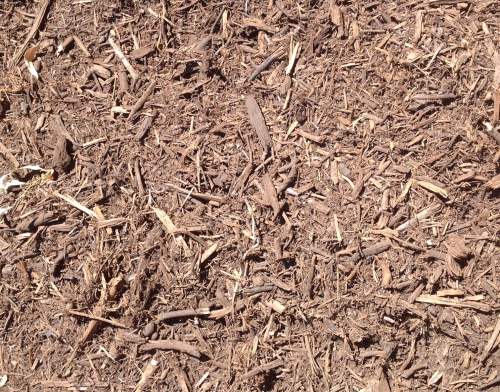 Mulch! If you haven't already mulched your garden, don't delay. Use a good quality soil wetter (Like Eco-wet) on hydrophobic soils, and get your mulch down. If you've laid mulch earlier in Spring, check to see how much has broken down & whether there's areas that need topping up. (Vegie gardens in particular that have been mulched with straw or pea straw may need a top up as the straw breaks down fairly quickly.)
Mulch! If you haven't already mulched your garden, don't delay. Use a good quality soil wetter (Like Eco-wet) on hydrophobic soils, and get your mulch down. If you've laid mulch earlier in Spring, check to see how much has broken down & whether there's areas that need topping up. (Vegie gardens in particular that have been mulched with straw or pea straw may need a top up as the straw breaks down fairly quickly.)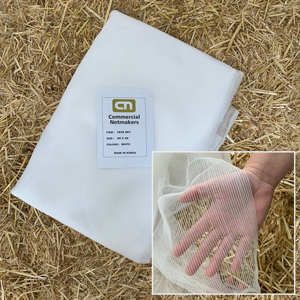 Fruit trees should be netted and protected against fruit fly by now ~ or as fruit is beginning to form. Thin fruit crops - it seems counter-intuitive, but it will result in larger and better tasting fruit. It will mean that you'll likely get a good crop the following year, too. Thinning fruit takes stress off the plant and encourages even fruiting patterns. Bagging grapes will need to happen once they start to flesh out & before the birds find them. Tip prune grapevines to encourage vines to put energy into forming fruit, rather than spreading foliage. @GLSC we've got insect netting packs (pictured) and fruit protection bags. Grab 'em quick - they're popular!
Fruit trees should be netted and protected against fruit fly by now ~ or as fruit is beginning to form. Thin fruit crops - it seems counter-intuitive, but it will result in larger and better tasting fruit. It will mean that you'll likely get a good crop the following year, too. Thinning fruit takes stress off the plant and encourages even fruiting patterns. Bagging grapes will need to happen once they start to flesh out & before the birds find them. Tip prune grapevines to encourage vines to put energy into forming fruit, rather than spreading foliage. @GLSC we've got insect netting packs (pictured) and fruit protection bags. Grab 'em quick - they're popular!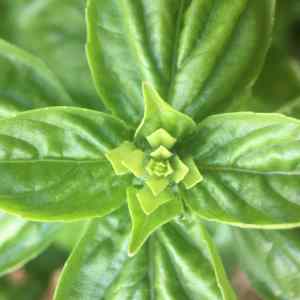 Basil, Beans (snake beans are highly recommended for summer, as they can handle the hot weather), Beetroot, Capsicum, Chilli, Carrots, Chokos, Cucumber, Eggplant, Ginger, Leeks, Lettuce, Loofah, Malabar Spinach, Okra, Parsnips, Pumpkin, Radish, Rockmelon, Rosella, Silverbeet, Spring Onions, Squash, Strawberries, Sweet corn, Sweet potato, Tomatoes, Watermelon, Zucchini.
Basil, Beans (snake beans are highly recommended for summer, as they can handle the hot weather), Beetroot, Capsicum, Chilli, Carrots, Chokos, Cucumber, Eggplant, Ginger, Leeks, Lettuce, Loofah, Malabar Spinach, Okra, Parsnips, Pumpkin, Radish, Rockmelon, Rosella, Silverbeet, Spring Onions, Squash, Strawberries, Sweet corn, Sweet potato, Tomatoes, Watermelon, Zucchini. Of course, healthy plants are much more resistant to pests and diseases - we're still getting used to conditions in our 'new' garden, and due to limited space, have deliberately planted heavily. This experiment has paid off for the most part, but sometimes overcrowding and lack of light or airflow can be an issue. While I usually don't do a lot to treat pests - the mites have bred up quickly and our bean crop is beginning to yield well - so I will need to do something so we don't lose all of the plants prematurely.
Of course, healthy plants are much more resistant to pests and diseases - we're still getting used to conditions in our 'new' garden, and due to limited space, have deliberately planted heavily. This experiment has paid off for the most part, but sometimes overcrowding and lack of light or airflow can be an issue. While I usually don't do a lot to treat pests - the mites have bred up quickly and our bean crop is beginning to yield well - so I will need to do something so we don't lose all of the plants prematurely.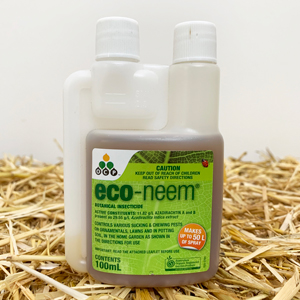 Neem Oil
Neem Oil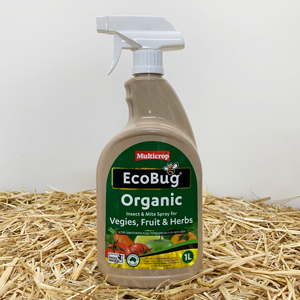 Natural Soap/Potassium Soap
Natural Soap/Potassium Soap Horticultural Pest Oil
Horticultural Pest Oil If you're looking for garden gift ideas for your loved ones, then here's a quick list:-
If you're looking for garden gift ideas for your loved ones, then here's a quick list:-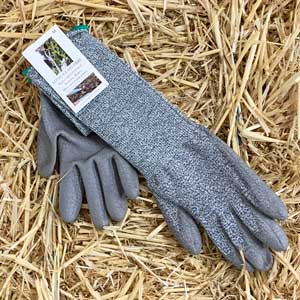 Long fibreglass coated gardening gloves $28
Long fibreglass coated gardening gloves $28 Books & grow guides from $12
Books & grow guides from $12  Perth's sandy soil can lead to water pooling on the surface, making it difficult for plants to access moisture. Use a good quality soil wetting agent like EcoWet or the new Verigrow soil wetter to facilitate water penetration. For long-term benefits, incorporate water-holding materials such as clay. Watheroo bentonite, Sand Remedy, and Cassies Clay are excellent choices, endorsed by the WA Water Corporation. Charlie Charcoal, with its absorbent nature, complements these products, enhancing soil structure and nutrient holding. The benefit of using one or a combination of these minerals is that it’s a one-off expense. The minerals will bond with sand in the soil and act like a sponge to permanently improve the soil structure. Addressing your soil structure first is key in water efficiency and long term plant health. (Bring in a sample of your soil if you'd like us to show you how these additives can work for you!) Once you've addressed the water repellency issue,
Perth's sandy soil can lead to water pooling on the surface, making it difficult for plants to access moisture. Use a good quality soil wetting agent like EcoWet or the new Verigrow soil wetter to facilitate water penetration. For long-term benefits, incorporate water-holding materials such as clay. Watheroo bentonite, Sand Remedy, and Cassies Clay are excellent choices, endorsed by the WA Water Corporation. Charlie Charcoal, with its absorbent nature, complements these products, enhancing soil structure and nutrient holding. The benefit of using one or a combination of these minerals is that it’s a one-off expense. The minerals will bond with sand in the soil and act like a sponge to permanently improve the soil structure. Addressing your soil structure first is key in water efficiency and long term plant health. (Bring in a sample of your soil if you'd like us to show you how these additives can work for you!) Once you've addressed the water repellency issue, 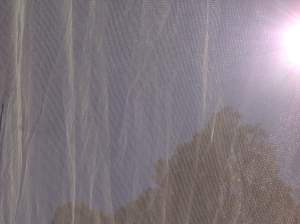 Our plants need help in heatwave conditions to survive! Shade protection can be permanent and highly designed structures; or you can set up something simple and temporary as required. Your plants won’t really care but they’ll be grateful for whatever you can do! Simple & low cost structures can be rigged using wire, garden stakes, star pickets, and/or polypipe. You can repurpose old curtains or sheets if you can’t stretch to shadecloth or shade sails.
Our plants need help in heatwave conditions to survive! Shade protection can be permanent and highly designed structures; or you can set up something simple and temporary as required. Your plants won’t really care but they’ll be grateful for whatever you can do! Simple & low cost structures can be rigged using wire, garden stakes, star pickets, and/or polypipe. You can repurpose old curtains or sheets if you can’t stretch to shadecloth or shade sails..JPG) Stressed plants are more susceptible to pest and disease attack, so keeping plants as healthy as possible is important. Certain pests seem to build up numbers when the weather warms up. Things like white cabbage butterfly, ants and grasshoppers seem to build numbers over summer. This Spring, the cabbage moth and cabbage butterfly caterpillars, together with army worm caterpillars seem to have been around in very large numbers. I know a lot of customers have had crops decimated! I've noticed that now there are more wasps about - they are natural caterpillar predators and can help with pest control. If you need to use a treatment, Dipel is considered an organic treatment - it only affects caterpillars (and creatures who prey on them) but won't harm pollinators.
Stressed plants are more susceptible to pest and disease attack, so keeping plants as healthy as possible is important. Certain pests seem to build up numbers when the weather warms up. Things like white cabbage butterfly, ants and grasshoppers seem to build numbers over summer. This Spring, the cabbage moth and cabbage butterfly caterpillars, together with army worm caterpillars seem to have been around in very large numbers. I know a lot of customers have had crops decimated! I've noticed that now there are more wasps about - they are natural caterpillar predators and can help with pest control. If you need to use a treatment, Dipel is considered an organic treatment - it only affects caterpillars (and creatures who prey on them) but won't harm pollinators.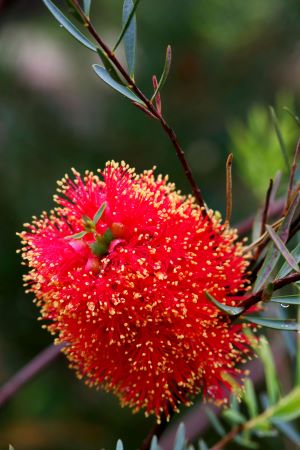 Encouraging birds, lizards and frogs to your garden will help with pest control. Keep bowls of water around for garden visitors and make sure you top them up as they’ll come to rely it.
Encouraging birds, lizards and frogs to your garden will help with pest control. Keep bowls of water around for garden visitors and make sure you top them up as they’ll come to rely it.  Reticulation is your garden's lifeline to water over the summer - and having a good system gives you reliable performance and peace of mind if you're going away over the holidays. But how much does a decent system cost?
Reticulation is your garden's lifeline to water over the summer - and having a good system gives you reliable performance and peace of mind if you're going away over the holidays. But how much does a decent system cost? 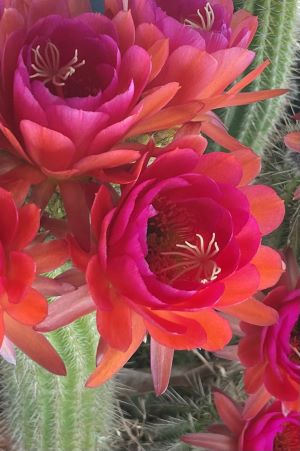
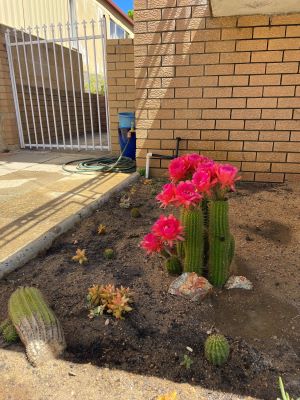
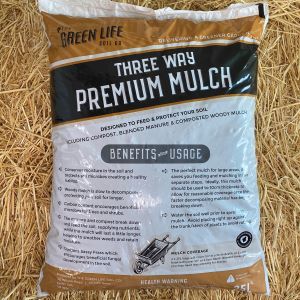 This is one of our most popular mulches - as the name suggests, it is a blend of three products - compost, blended aged sheep & cow manure, and a woody mulch. To this, we add some Sassy Frass - which is hugely beneficial in promoting beneficial fungi in the soil. Sassy Frass & the woody mulch work together to assist in making conditions suitable for a range of soil fungi - which in turn, assist plant health and build soil structure - leading to increased water and nutrient retention. The organic matter in the compost blend (which is activated by our special inoculants) and manure also feed the plants; so it's the perfect combination for feeding & protecting your soil.
This is one of our most popular mulches - as the name suggests, it is a blend of three products - compost, blended aged sheep & cow manure, and a woody mulch. To this, we add some Sassy Frass - which is hugely beneficial in promoting beneficial fungi in the soil. Sassy Frass & the woody mulch work together to assist in making conditions suitable for a range of soil fungi - which in turn, assist plant health and build soil structure - leading to increased water and nutrient retention. The organic matter in the compost blend (which is activated by our special inoculants) and manure also feed the plants; so it's the perfect combination for feeding & protecting your soil.  Aquaponics WA / Hydroponic Xpress - Canning Vale 9455 2133 (Living Soil only)
Aquaponics WA / Hydroponic Xpress - Canning Vale 9455 2133 (Living Soil only)




















